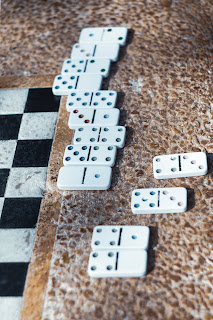With the loosening of some COVID-19 restrictions, some of us can now visit in small groups of family and friends. Here are some fun and silly games that were played at gatherings in the parlors of homes during the Victorian time period. You probably already know how to play Charades and Blind Man’s Buff, so those won’t be described here. But do give the following games a try.
Squeak Piggy SqueakThis was a popular variation of Blind Man’s Buff. One person is the Farmer, the others are Piggies. The Piggies sit in a circle with the Farmer in the center. The Farmer sits on a pillow or large cushion. The Farmer is blindfolded and spun around two or three times.
The Farmer picks up the pillow and goes over to one of the Piggies. He puts the pillow on the PIggie’s lap. The Farmer must sit on the pillow without touching the Piggie with his (or her) hands. This is to maintain the anonymity of the Piggies.
When the Farmer is sitting, he says “Squeak, piggie, squeak.” The Piggie then makes squeaking sounds. The farmer has to identify the Piggie. If the Farmer is correct, the identified Piggie changes places with the Farmer. While the new Farmer is being blindfolded and spun around, the other Piggies can change places.
If the Farmer is unable to identify the Piggie, he must return to the center with his pillow to be spun around again. The Piggies can change places.
The Minister’s CatThe first person chooses a letter of the alphabet and describes the cat with an adjective beginning with that letter. For instance, for the letter B: “The minister’s cat is a beautiful cat.”
The next person has to use a different adjective starting with the same letter, for example: “The minister’s cat is a belligerent cat.” The game continues until someone can’t think of an appropriate adjective. Then they get to choose another letter to start the game over.
LookaboutA small object is selected and shown to all players. One person stays in the room and everyone else leaves. The remaining person places the object somewhere unobtrusive. It must remain in view, but can be placed higher or lower than eye level, and can be placed with other objects.
The other players return and look around to find the object. When they find the object, they should continue to pretend to look around a little, then sit down so as not to give away the location. The game continues until the next-to-last player finds the item and sits down. Then the remaining player is the one who gets to hide the object for the next game play.
ForfeitsOne person is chosen as the Judge, and leaves the room. The other players put a small personal item (a piece of jewelry or something from their pocket or purse, or a shoelace or necktie) into a box. The Judge is then invited into the room.
The Judge selects an item from the box and describes it. The owner of the item must identify himself. The Judge then sets a forfeit, something either amusing or embarrassing that must be done in order to reclaim the object. If the owner of the item refuses to do the forfeit, the Judge gets to keep the item.
Forfeits could be actions such as to sing a song, tell a story, make 3 people laugh, yawn until someone else yawns, hop around the circle on one foot, rub your head while patting your stomach, tell something embarrassing that happened to you, or say “red lorry yellow lorry” five times fast. (Remember the ages of players involved, and don’t make the forfeits inappropriate!)
A variation is to have the Judge guess the owner of the item. If guessed correctly, the owner pays a forfeit before getting the item back. If guessed incorrectly, the item is returned without forfeit.
Dictionary
Every player uses a dictionary to write down a word nobody else is likely to know. They then write the correct definition in simple terms, and two incorrect but plausible definitions. The words and potential definitions are read aloud.,
Example: Nudiustertian
A) person who likes to be nude
B) the day before yesterday
C) a slug-like marine animal with gills
(B is Correct.)
You earn points for getting the correct definition for the words you did not look up. The person with the most points at the end is the winner.
The Sculptor
One person is chosen to be the sculptor. All the others stand still while the Sculptor walks around and positions everyone into silly poses. Players are not allowed to laugh, smile, or move.
The first person to break the statue role changes places with the Sculptor and resumes positioning the others. Play until everyone has had a chance to be the Sculptor.
Change Seats!
This is sort of like musical chairs. All but one player sit in a circle of chairs, with “It” standing in the center of the circle. “It” chooses someone in the circle and asks him or her, “Do you love your neighbor?”
If the answer given is “No,” then the people on either side must get up and exchange seats while “It” tries to sit down on one of the vacated chairs.
If the answer given is “Yes, but I don’t love people who [and then list some characteristic that pertains to two or more other players, such as “have brown hair,” or “is wearing a sweater”],” then everyone with that characteristic must get up and exchange chairs while “It” tries to sit on a vacated chair.
If “It” manages to sit in an open chair, the person left standing becomes “It” for the next round.
Fruit Bowl
This is another game similar to musical chairs, appropriate for larger groups. Everyone including the designated first “It” draws the name of a fruit (apple, blueberry, pear, etc.) out of a hat. Be sure there are more than one of each named fruit and that the number of slips matches the number of players.
“It” calls out the name of a fruit. Players who have chosen that fruit must stand and switch seats while “It” tries to sit on one of the vacated chairs. The last person standing becomes “It” for the next round.
The Laughing Game
This must be done with a straight face. The first players says “ha.” The second player says “ha ha.” The third player says “ha ha ha,” and so forth. The first person to smile or laugh is out of the game and the game begins again.
Elephant’s Foot Umbrella Stand
This item may have been more recognizable in the Victorian time period, but the game is fun in modern times. The leader thinks of a rule (for example, the item’s name must end in the letter D, or the item must be made from animal skin) and says “I went to the store and bought an elephant’s foot umbrella stand.” The other players tell what they bought at the store and the leader responds with hints to help them guess the rule.
For example, if the rule chosen by the leader was that the item must be made from animal skin, a player might say, “I went to the store and bought a diamond.” The leader would say, “Sorry, they are all out of diamonds.” (However, if the rule was that the words had to end in the letter D, the leader says, “Good shopping.”)
If a player guessed, “I went to the store and bought a coonskin cap,” the leader would say “Good shopping” for the animal skin rule, but “They were all out of coonskin caps” for the ends-in-D rule.
The first person to correctly guess the leader’s rule becomes the leader for the next round of play.
Wink Wink Murder
This works well with a larger group. Use a deck of cards or some other means to identify two people anonymously, one to become the Murderer who does not reveal this, and the other to become the Detective, who declares his or her role.
The group mingles. When the Murderer makes eye contact with someone and winks at them, that person must slump down and remain as if dead.
The Detective attempts to identify the Murderer.
Are you there, Moriarty?
This game may be the strangest of all. No idea how it got its name.
Two players lie on the floor, blindfolded, aligned head to head with feet pointing away from each other. There should be about an arm’s length between their heads. Both players hold rolled-up newspapers.
One player asks, “Are you there, Moriarty?” The other answers, “Yes!”
Then the battle begins as they attempt to swat each other with their rolled-up newspaper. Both players are allowed to roll around to escape their opponent’s flailing blows.





